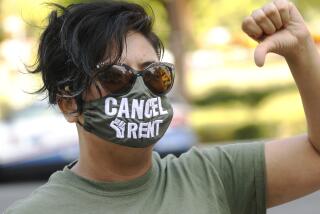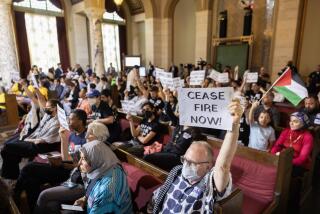L.A. Council Wants to Have the Last Word About Offensive Language
- Share via
The Los Angeles City Council jumped into a national cultural debate about racist speech Wednesday, asking the city attorney to draft a law to clamp down on offensive language during public meetings.
The request was sparked by a black man using a racial epithet during at least three recent City Council sessions, offending council members.
Michael Hunt, 43, of Palms used the word “nigger” in voicing his complaints about a new city regulation that restricts the types of items that can be sold along the Venice boardwalk. Hunt said in a later interview that he was referring to himself and trying to illustrate his point that City Hall discriminates against blacks.
But council members took offense. Although many blacks consider the word highly offensive, it is also used in rap music and stand-up comedy. And some blacks use the term informally with other blacks.
Several council members registered their disgust when Hunt used the term, and Councilman Bernard C. Parks, who also is black, decided he had had enough.
He asked the city attorney to create a rule that would prohibit speakers before the council from using racial epithets and other vulgarities during the public comment portion of the meetings. The council quickly agreed Wednesday, and a draft proposal should be ready in a few weeks.
The challenge, said 1st Amendment experts, will be in drafting a rule that does not infringe on speakers’ right to express unpopular opinions.
“I too want to ensure that we protect one’s civil rights,” said Councilman Herb Wesson, who is black. “I want to say that regardless of what we do, I’m not going to stand here and let someone use that word again.”
The use of the word is an especially delicate topic -- and not just for the Los Angeles City Council.
During the O.J. Simpson trial, prosecutor Christopher Darden and defense attorney Johnnie L. Cochran Jr. sparred over whether witnesses should be questioned about their own use of the word.
Darden argued that it was so inflammatory that it might distract and overwhelm jurors, while Cochran upbraided the younger attorney for patronizing the panel, which was not present for the argument. Their debate in the midst of that celebrated case helped frame its racial dimensions and sparked a national conversation about the effect of the word on those who hear it.
Council President Eric Garcetti said that under existing rules he can have the sergeant-at-arms remove a speaker who threatens a council member or the public. But there is no specific policy regarding language.
“I’d rather have a set policy because I think that when you formalize things it makes it more clear to people what the expectations are,” Garcetti said.
Carol Sobel, a civil rights attorney, said defining what is unacceptable is key.
“You can easily pass rules that say you can’t engage in obscenity, but you’d have to define it,” she said.
Other cities have wrestled with similar issues.
At a Santa Cruz City Council meeting four years ago, a man flashed the Nazi salute to protest what he believed was fascist behavior by the council. He was ejected and cited for disrupting the council meeting. He later claimed in a lawsuit that the city had infringed on his right to free speech. The case was dismissed by a trial court but an appeals court intervened and ordered a jury trial, which is scheduled to begin in November.
Eugene Volokh, a UCLA expert on the 1st Amendment, said it is probably OK under current case law for the council to draw up a list of words that are no longer permissible. However, he said the more difficult thing is to regulate racist sentiments.
“Let’s say someone tells the council that the Police Department should police a certain area because it’s populated by some group that they believe is inherently criminal,” Volokh said. “That’s a bad view, and the council would be right to reject this view, but it cannot exclude this view from hearings.”
Early indications are that the city attorney’s office will draft a rule that would avoid banning specific words but would allow the council member presiding over the meeting to warn speakers that their language was disruptive.
Hunt, whose testimony at the meetings prompted the crackdown, defended his actions Wednesday before the council while wearing a T-shirt displaying the word that sparked the uproar.
“If the word is in the dictionary, it should be allowed in public forum as long as it’s not directed toward you in a negative way,” he told the council.
*
Times staff writer Jim Newton contributed to this report.
More to Read
Sign up for Essential California
The most important California stories and recommendations in your inbox every morning.
You may occasionally receive promotional content from the Los Angeles Times.










